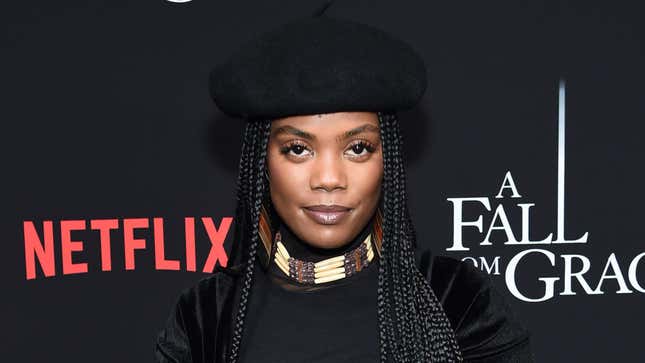
In a celebrity landscape that increasingly includes stars like Lupita Nyong’o, Viola Davis, Jodie Turner-Smith, Yvonne Orji, KiKi Layne, Danai Gurira and more, it can easy to convince yourself that we’re moving into a post-colorism era in Hollywood...and like the farce that was “post-racial,” you’d be wrong.
That’s the point actress Novi Brown, who stars in Tyler Perry’s Sistas on BET, drove home during an appearance on SiriusXM’s The Clay Cane Show, where she got candid about the obstacles she’s faced while gaining traction in Hollywood as a “brown-skinned girl who likes natural hairstyles,” pointing out the ways colorism persists in everything from our language to our media to even the makeup chairs she often sits in as an actress.
“As a brown skin girl in the industry, especially with natural hair, it’s been very difficult,” said Brown. “People don’t know what to do with your hair. You come onto set, they have your photo, they don’t know how to do your makeup, and it’s just like, Oh, so you don’t even appreciate who I am as a peer, as a coworker of yours that you wouldn’t even go out there and learn your artistry as a makeup artist or a hairstylist because to incorporate somebody that looks like me?”
“Why do I have to come with my hair prepped? Why do I have to come with my own foundation? Why do I have to teach you how to light me?” she asks. “There is just a blatant disrespect.”
As for Brown’s own journey into celebrating her skin color and natural hair texture, she credits it to an “accident”—and ultimately a happy one since a “big chop” became a gateway to both self-acceptance and success.
“It was accident that I went natural,” she recalls. “At the time, I had wanted a hairstyle like Tom Cruise and Katie Holmes; remember when they had the same haircut? That’s the haircut I wanted, but do you see how warped that is for a black girl to think that her hair could be that of a white person? My texture is not of theirs, so why would I even want to try to aspire to that? That’s not natural for me, but there’s not enough representation, correct?”
“There’s not enough people for me to look to, and of course we have our classics like Nia Long, all the beautiful people who’ve done the short hair, but again, Halle Berry, Toni Braxton,” she continued. “I didn’t realize what I was getting myself into when I cut my hair…but from there is when I started booking, it was crazy. Like I was just booking commercials and booking little modeling gigs here and there all because I was stepping back into the authentic version of myself. And that’s what I really feel like the natural hair movement is about.”
Now a passionate advocate for both self-acceptance and self-expression, she urges Cane’s audience to do the same, in whatever way that manifests for them. “That’s what it is for me with my hair: connecting to myself and being more than happy with what I have going on,” she says. “And I want to bring that into the media spaces and bring that to different characters regardless of their standard or stature.”



